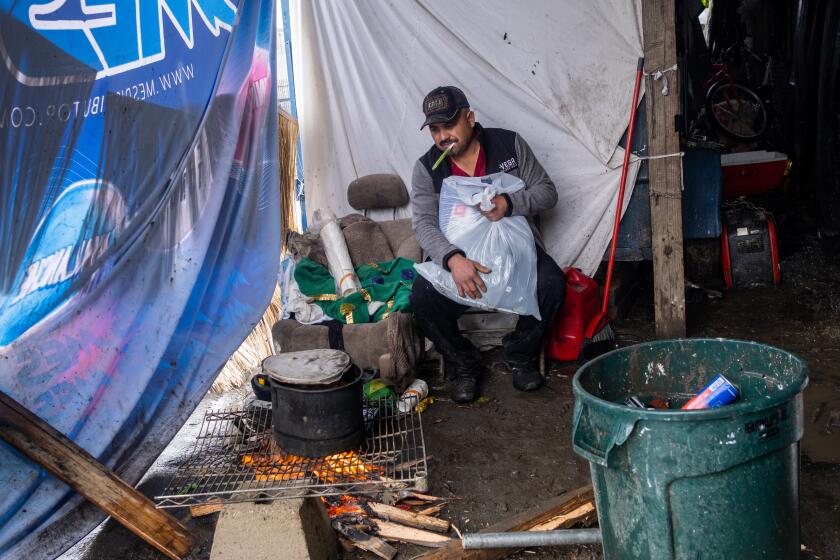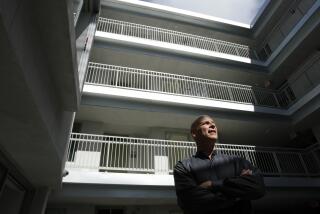Project Roomkey: Lessons learned from a massive program to save the lives of homeless people
The state program that provided private hotel and motel rooms for homeless people during the COVID pandemic improved healthcare for thousands and provided valuable lessons for how shelters could better serve their clients, a two-year study has found.
The study released Monday by the research and consulting firm Abt Global concluded that Project Roomkey served its primary goals of saving lives during the pandemic and relieving stress on the healthcare system.
“Not only were people getting inside, they were getting treated for healthcare conditions that had never been treated since they became homeless,” Nichole Fiore, lead author and principal associate at Abt Global said in an interview.
But the inability to connect information collected at the hotel and motel sites with statewide data from health, housing and other public services agencies left the researchers with only anecdotal evidence to substantiate that conclusion.
“They all use different data systems that do not talk to each other,” Fiore said.
Among its recommendations, Abt Global, formerly Abt Associates, said better data sharing agreements are needed across state agencies and departments.
“We need to understand how people are interacting with the many public systems, programs and benefits, which combination of programs and benefits are best at preventing and resolving homelessness and who is most at risk for homelessness,” the authors wrote.
The study, funded by the California Health Care Foundation and the Conrad N. Hilton Foundation, gathered data from an online survey of Project Roomkey funded agencies in 45 counties, telephone interviews with providers in 15 counties and site visits in five counties including interviews with 67 current and former clients.
The researchers also had access to administrative data from the California Department of Social Services collected from the Project Roomkey agencies, and homeless databases from three counties: Los Angeles, Ventura and Tulare.
The CDSS data provided an overall picture showing that 62,000 people obtained rooms across the state. The program peaked in October of 2020 with just under 13,000 clients. That number declined steadily to just a few by the end of 2023.
Of those, 22% exited to permanent housing, either subsidized or unsubsidized; 11% moved in temporarily with friends or family or to transitional housing or motels; 25% went to other emergency shelter; 4% transferred to institutions such as hospitals or board and care homes; 15% returned to the street and 23% were unaccounted for.
They came with health conditions including chronic lung disease, moderate to severe asthma, serious heart conditions, compromised immune system, severe obesity, diabetes, and chronic kidney and liver disease.
A monthly payment of $750 to $1,000 would allow thousands of the city’s homeless people to find informal housing, according to a policy brief by four L.A. academics.
The homeless databases from the three counties showed that about three-fourths of participants had access to Medicaid or other insurance, but many were not able to use it or did not for a variety of reasons.
One woman said she could never keep track of appointments because she couldn’t keep her phone charged, Fiore said. A man said he was embarrassed to see a doctor when he couldn’t shower.
“That’s where Project Roomkey was able to fill that gap,” Fiore said. “They brought in the nurses. They brought vaccines. They did wellness checks and built rapport. ‘You have diabetes. Do you have enough food? When are you going to see your endocrinologist?’”
Fiore said a provider who worked in a Project Roomkey site and later returned to a traditional shelter told her, “This is what we need. We need to have healthcare at our interim sites.”
In the three counties for which they had data on individuals, the researchers found that residents in traditional shelters were more likely to obtain permanent housing. In Los Angeles only 19% of Project Roomkey clients moved on to permanent homes, compared with 25% of those leaving shelters.
However, the researchers found that the longer someone stayed in a Project Roomkey room the more likely they were to exit to a permanent home.
In Los Angeles, only 19% of those who stayed one to three months obtained permanent housing. The rate was 36% for those who stayed a year and 51% after 18 months.
“Longer lengths of stay in Project Roomkey accompanied by consistent, supportive services and available rental subsidies is key to creating a pathway to permanent housing,” the report said, recommending the continued use of hotels and motels for longer-term interim housing.
Though data limitations precluded a definitive explanation, the report suggested that the phenomenon could reflect the evolving goals of Project Roomkey which began as an emergency program and added more housing services over time.
COVID isolation may also have been a factor.
“Physically I was getting better when I was at the ... hotel, but mentally … I was too isolated,” one client told the researchers. “I needed more interaction. It eventually came to a point where I was talking to the TV and arguing with myself in my room.”
The report listed several other obstacles including the uncertainty of federal funding.
Staff said “they would notify participants of an impending closure date, but then be notified by county leadership that FEMA funding was extended and the site would remain open,” the report said. As a result, participants became skeptical of the closure dates and delayed planning their exits.
Other obstacles included rules such as curfews, the difficulty of finding disabled-accessible units and the targeting of “the most decrepit motels.”
“However, despite these challenges, various state agencies, health clinicians, homeless service system leaders, public health experts, local governments, Tribal jurisdictions, and homeless service providers quickly came together to launch a program that transformed how homeless service systems offer interim housing across the state,” the report said.
“The quick design and program implementation and infusion of federal, state, and local resources to create and operate this program were unprecedented in their speed and scale.”
How participants felt about Project Roomkey varied.
“Some participants described rooms as small and run-down, others as spacious, new, and very clean,” the report said. “Some participants complained of vermin such as cockroaches and rodents. Overwhelmingly, participants expressed appreciation for having their own private bathroom, including a toilet and shower, describing how Project Roomkey provided stability and allowed them to feel at ease:
“I felt rejuvenated,” one client told the researchers. “It was a place to recover, a space to recalibrate. It made you feel like you weren’t homeless.”
Among their recommendations, the authors said hotels and motels should continue to be used for interim housing and that shelter programs should promote stabilization by providing longer stays with more support services.
“This model for providing shelter gave people autonomy, privacy, and safety,” they wrote.
More to Read
Sign up for Essential California
The most important California stories and recommendations in your inbox every morning.
You may occasionally receive promotional content from the Los Angeles Times.












